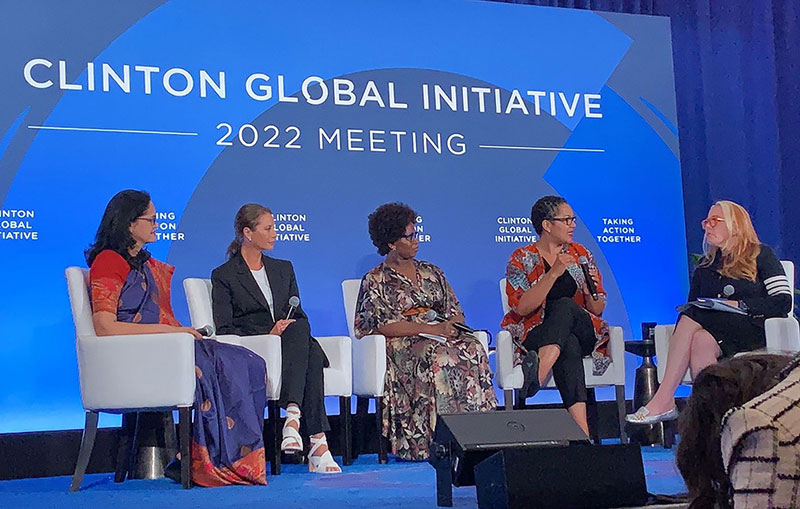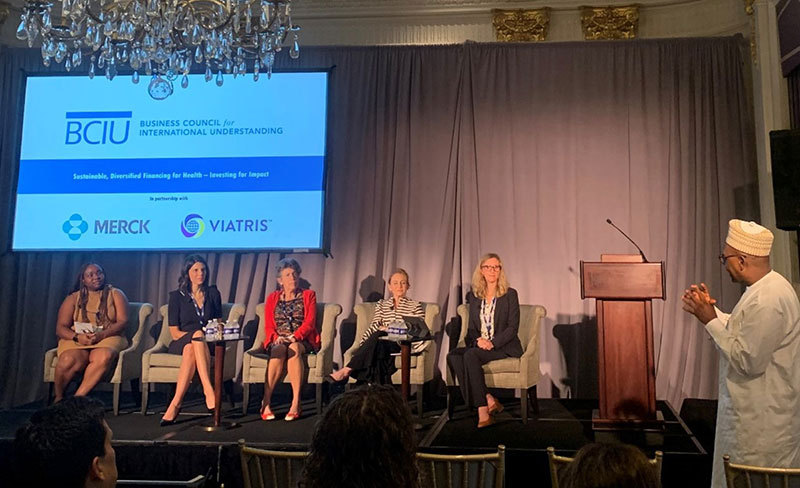Key takeaways from this year’s U.N. General Assembly
Merck leaders engaged with the global community on a host of topics
September 28, 2022

The 77th session of the United Nations General Assembly in New York was held against a backdrop of complex, interconnected international issues. Leaders from across Merck attended, driving conversations unified around our purpose of using the power of leading-edge science to save and improve lives around the world.
It’s been seven years since U.N. member states adopted the 2030 Agenda for Sustainable Development, a shared blueprint for peace and prosperity for people and the planet now and into the future. The Agenda is focused around 17 core Sustainable Development Goals (SDGs) — an urgent call for action by all countries in a global partnership. As a company, our strategic framework and Environmental, Sustainability and Governance (ESG) targets align to SDG #3, which centers on good health and well-being.
Over the course of the U.N. General Assembly colleagues from across our company served as thought leaders in shaping solutions to advance health equity, drive innovation and investment in health, reaffirm key public health commitments and forge partnerships for impact.


“It was an honor to participate and connect with respected global health leaders to explore tangible solutions to local and global challenges,” said Drew Otoo, president, global vaccines, who participated in several events, including a fireside chat with Michael Nyenhuis, president and CEO of UNICEF, and Jose Manuel Barroso, board chair of Gavi, the Vaccine Alliance, about the importance of global health care initiatives.
“There is much work to be done, but with the leaders and innovators at the U.N. General Assembly and in our communities, I’m optimistic and excited about what lies ahead.”
- Drew Otoo, president, global vaccines
In the continuing fight against HIV, Go Further — a public-private partnership between the President’s Emergency Plan for AIDS Relief (PEPFAR), Merck, the George W. Bush Institute, UNAIDS and Roche — continues to save the lives of women across sub-Saharan Africa. Carmen Villar, VP, social business innovation, joined a panel to celebrate 20 years of PEPFAR, which has saved the lives of more than 20 million people since its inception.
Elsewhere, during the Devex UHC Pavilion Merck for Mothers announced the Strengthening Systems for Safer Childbirth initiative, supporting six locally led coalitions in India, Kenya, Nigeria and Sierra Leone to address maternal health challenges informed by local priorities and locally led solutions to accelerate impact. Partners were joined by the Dr. Austin Demby, the minister of health and sanitation for Sierra Leone, who commended the approach being taken by Merck.
At the Clinton Global Initiative’s panel on overcoming challenges to sexual and reproductive health and rights, Mary-Ann Etiebet, AVP, health equity, said, “Teams across our company are working to generate fresh thinking and catalyze new approaches to improve access to health. At the U.N. General Assembly, we’ve had the opportunity to demonstrate the value of these efforts for addressing unmet needs.”

Girl Effect, a global non-profit using media and mobile tech to empower girls to change their lives, also announced a $1 million commitment from Merck for Mothers to create a new digital ecosystem linking solutions to address unmet demand for modern contraception for adolescent girls and young women in Kenya.

Julia Spencer, AVP for global multilateral engagement, strategic alliances, and international relations, moderated a panel titled “Sustainable, Diversified Financing for Health: Investing for Impact,” in which government and multi-sectoral partners identified actions to increase public sector investment in health and leverage catalytic financing models in collaboration with the private sector.
These and all our colleagues’ activities throughout the General Assembly are important components of our commitment to shaping solutions for health equity, sustainability and science around the world.


